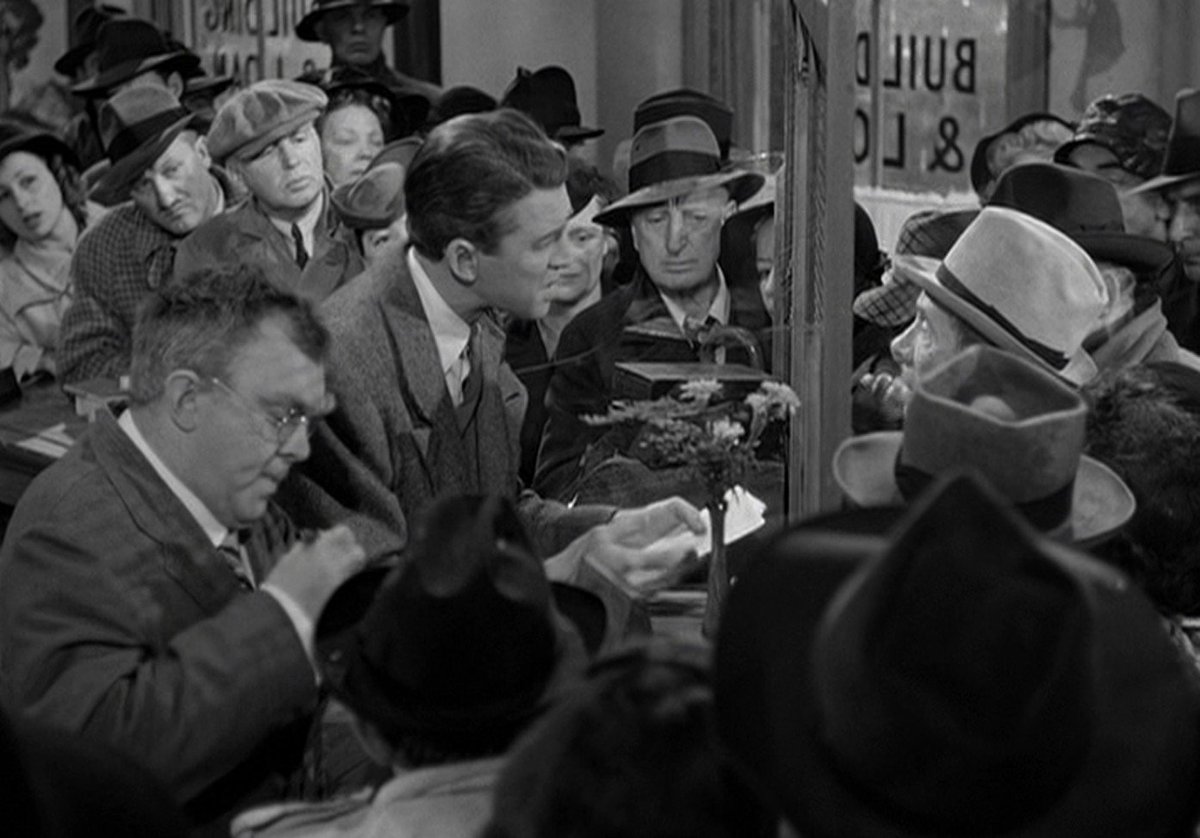Month: December 2017
December 31, 2017
-
Thought
👍🏻→ 👎🏻
San Junipero
National Anthem
White Bear
White Christmas
Hated In The Nation
Be Right Back
Crocodile
Hang The DJ
Waldo Moment
Metalhead
Playtest
Entire History Of You
Shut Up and Dance
Black Museum
Men Against Fire
Arkangel
Fifteen Million Merits
USS Callister
Nosedive -
Bookmark
The Rise and Fall of Hype Machine, the Internet’s Forgotten Fave
“A juggernaut of growing influence,” “[one of] 100 essential websites,” “the future of all media” – in the late 2000s, Hype Machine was being fêted as few sites ever have been. Founded in 2005 by then 19-year-old college student Anthony Volodkin, the music blog aggregator unexpectedly exploded.…
December 29, 2017
-
Guest Album Review – “White Light, White Heat, White Trash” by Social Distortion
This guest review was originally part of a music blog project I created called Under The Deer. Since that site won’t be around forever, I’m archiving these wonderful reviews and their accompanying illustrations here. Writer and illustrator listed at end of the review.
Likely a play on The Velvet Underground’s White Light/White Heat, Social Distortion’s White Light, White Heat, White Trash is a coming of age confessional from Mike Ness and the band. From the contrite lead-off single I Was Wrong we get the sense that it’s time to fess up, something that lead singer/songwriter Ness seems eager to do. After spending time in and out of prison and rehab for his heroin addiction, Ness is using the four-year delay since Somewhere Between Heaven and Hell to sing about his pain, but also his awakening spirituality and self-realization.
With Untitled, Ness writes “you helped me hide my shame” and “once in a lifetime, twice in eternity – and nothing else matters anyway.” Is he writing about faith? About divine guidance? It seems so, and his spiritual yearnings continue with When the Angels Sing (a departed loved one?) and Down Here with the Rest of Us. Ness seems aware that he’s in a better place and issues a warning to others with Don’t Drag Me Down – a nitro-powered rocker that is likely as much self-affirmation as it is a warning. Certainly, someone with his history of drug addiction and problems with the law would realize that they were always only a small mistake away from losing it all again.
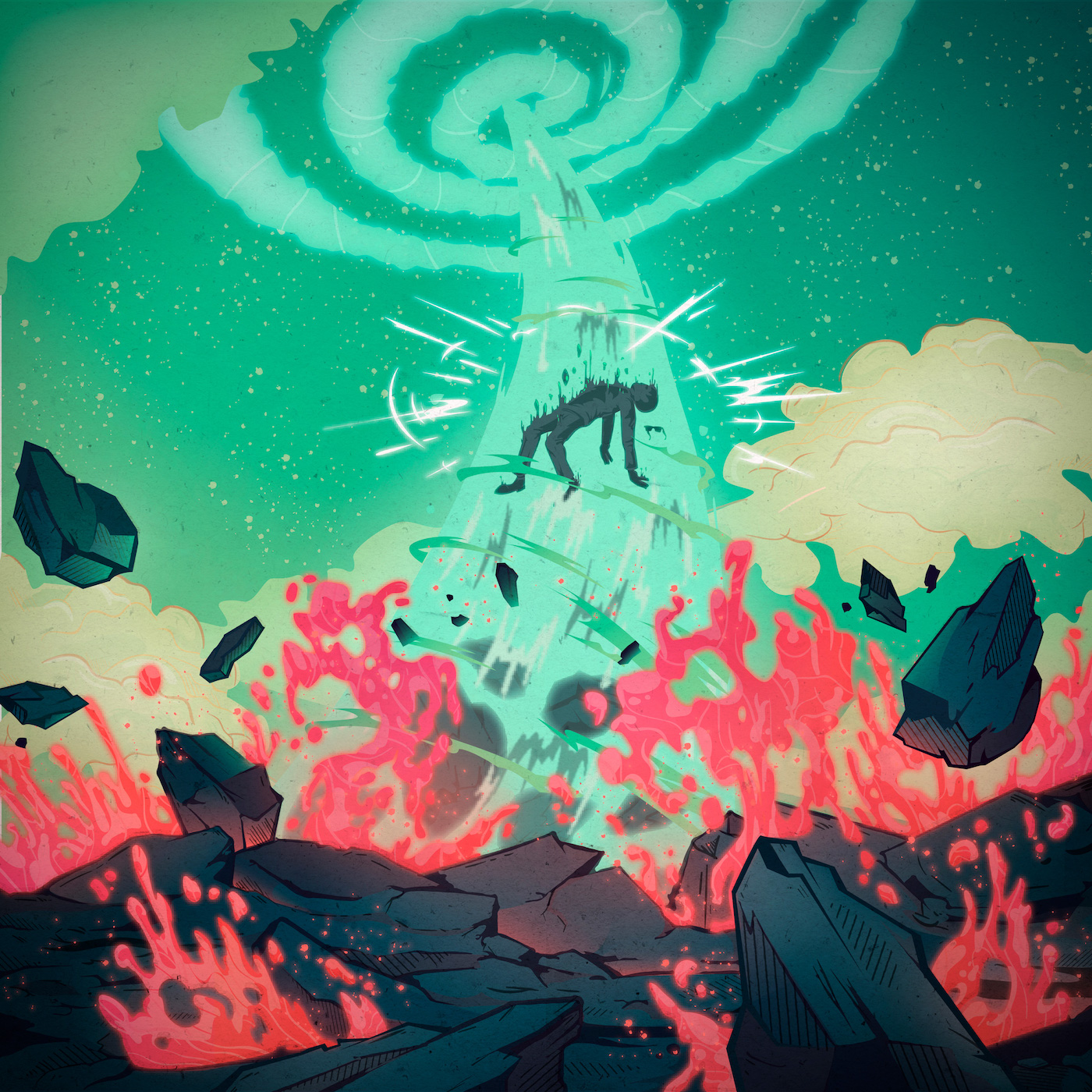
Up until this album, Social Distortion had been a punk band with an American roots influence, with honky-tonk country and rockabilly never far from the surface. With this album however they played it heavier, straighter, and with a tighter sound than ever before. It’s polished for sure, but never overdone.
The painful Dear Lover starts with chords so labored that they almost sound resigned to defeat. Ness’s raspy wail lets us know that yet another relationship has ended in ruins in grinding three chord fashion. “Up against the wall, why does love always have to hurt?” And while I Was Wrong has been crafted for radio, that’s not a bad thing. It not only stands out from the “I’m sick of waiting my turn” pseudo-punk songs of the day, but it opened Social Distortion up to a new demographic. It’s still heavy and hasn’t strayed that far from Social D’s sound. And isn’t Punk Music music that doesn’t care? Ness certainly doesn’t. If it’s not cool to apologize or to wonder if someone up there likes him, he does it anyway.
Ness’s guitar work has never been fuller or heavier than on this album. Most of the guitar sounds as if it’s been recorded on “11” and the feedback is barely under control, especially during his blistering solos. Even cover songs get the Ness guitar treatment. The band has covered songs on past albums, and this one is no different, with an updated version of the Stones’ Under My Thumb driving at double speed.
While the album charted higher than previous albums, mainly on the strength of I Was Wrong, critics have complained that the band had “sold out,” but in fact, this was Social Distortion’s most complex album to date.
Through These Eyes, Untitled, and Down on the World Again are all powerful rockers, and do what Social Distortion does best; show that they don’t fit in. While they may not fit in, the band, or Mike Ness, is taking responsibility for where they are and how they got there. The band is maturing on this album, and while it is still punk, it has a self-awareness that was missing from the first few albums.
Contributors

Scott McKinnon (Oakville, Canada) has been listening to music since the late 60’s starting with a suitcase phonograph that he still misses. He has played guitar for thirty years and doesn’t always hate the sound of his own voice. He road managed a band in the early 90’s and knows that February isn’t the best time to travel the prairies.
Scott currently owns a carpentry business where he reclaims wood and builds furniture.

While the Russians are still sticker bombing the Kremlin and the Chinese are secretly busy with making some illegal copies of his artwork, Klok Huis (Eeklo, Belgium) is pushing the limits in illustration circles as well as animation.
-
Thought
The breakfast place I’m in is playing “The End” by The Doors.
December 28, 2017
-
Thought
😢
It is with broken hearts that we share the terribly sad news that our beloved Rose Marie passed away this afternoon. https://t.co/boHpy71Fjx pic.twitter.com/qv9w8pNuOz
— Rose Marie-Official (@RoseMarie4Real) December 29, 2017
-
Thought
I remain optimistic.
-
Thought
Happens
I waked and my wife not come to bed; I lacked a pot, but there was none, and bitter cold, so was forced to rise and piss in the chimney.
— Samuel Pepys (@samuelpepys) December 28, 2017
December 27, 2017
-
Photo
Star Trek: The Doppelgänger
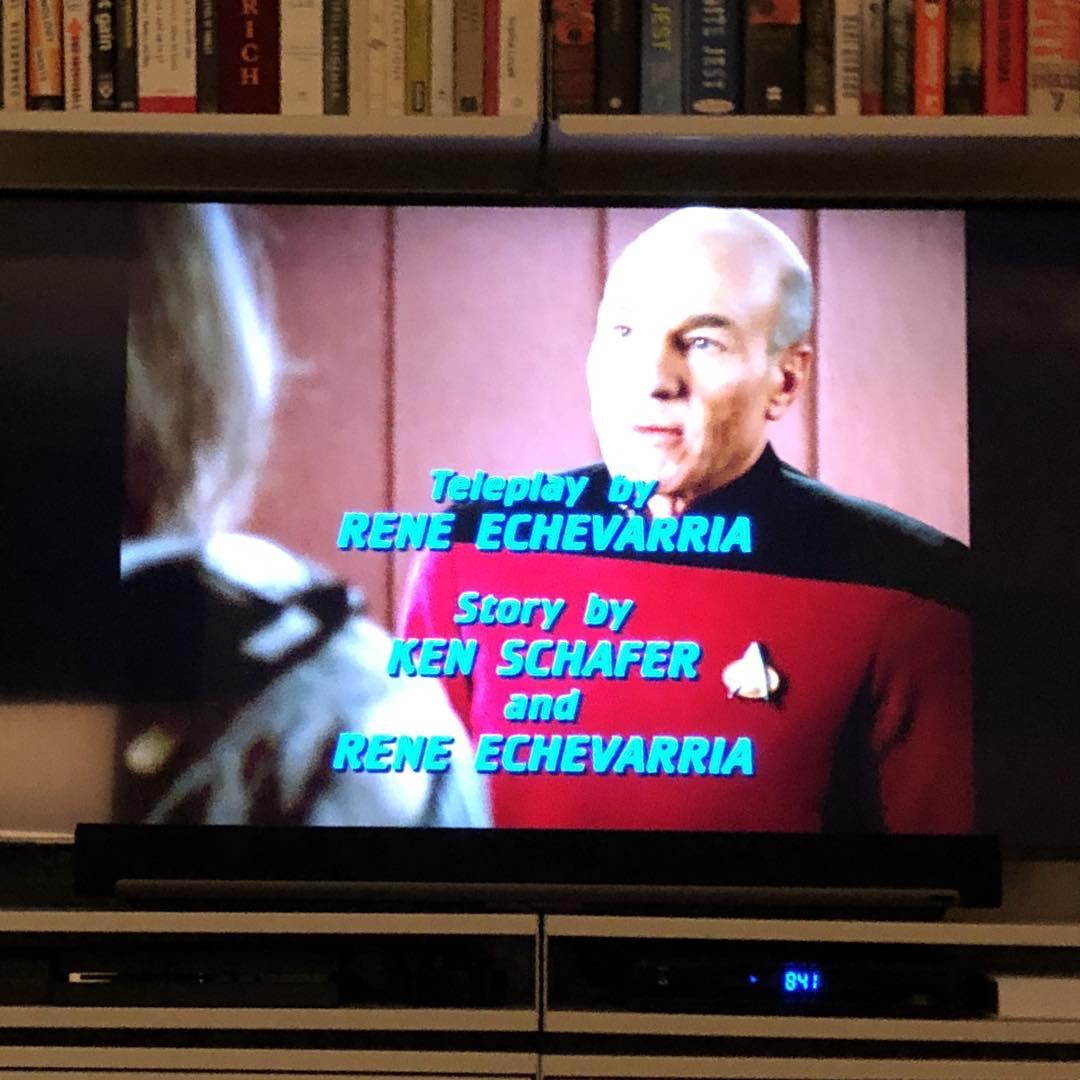
-
Guest Album Review – “Different Class” by Pulp
This guest review was originally part of a music blog project I created called Under The Deer. Since that site won’t be around forever, I’m archiving these wonderful reviews and their accompanying illustrations here. Writer and illustrator listed at end of the review.
Pulp’s rise to Britpop stardom in 1995 seems, in retrospect, fantastically unlikely.
Oasis and Blur were the two most prominent bands on the circuit, swapping places at the top of the UK singles chart as often as they were trading barbs in the tabloid press. Meanwhile, Pulp, were seventeen years into their career and had barely made a dent in the mainstream consciousness. While they were chalk and cheese on paper, the two biggest bands in Britain had one startling similarity; both offered glamorous facsimiles of what life in England was like in the nineties. Oasis were Northern council estate lads who’d soon be singing about champagne supernovae in the sky, while Blur were Southern rich kids hiring Phil Daniels to lend their mockney ruminations on everyday life a little more street credibility.
Pulp’s Jarvis Cocker – a working-class bloke from Sheffield who’d spent his formative years at a London art school – had done the rounds long enough to know that his band’s upcoming fifth album, Different Class, might just be their last shot at greatness. Taking a leaf out the book of his more political bandmates, Jarvis penned what would become the defining hit of the Britpop movement. Based on the years he spent at college and the class divide that left so many people in mid-nineties Britain feeling so dejected, Common People would rise to number 2 in the UK singles chart back when it meant something. Different Class became one of the most hotly anticipated albums of the year. Even more surprisingly, not only did Different Class manage to live up to expectations despite the hype behind it, it became one of the essential albums of the decade.
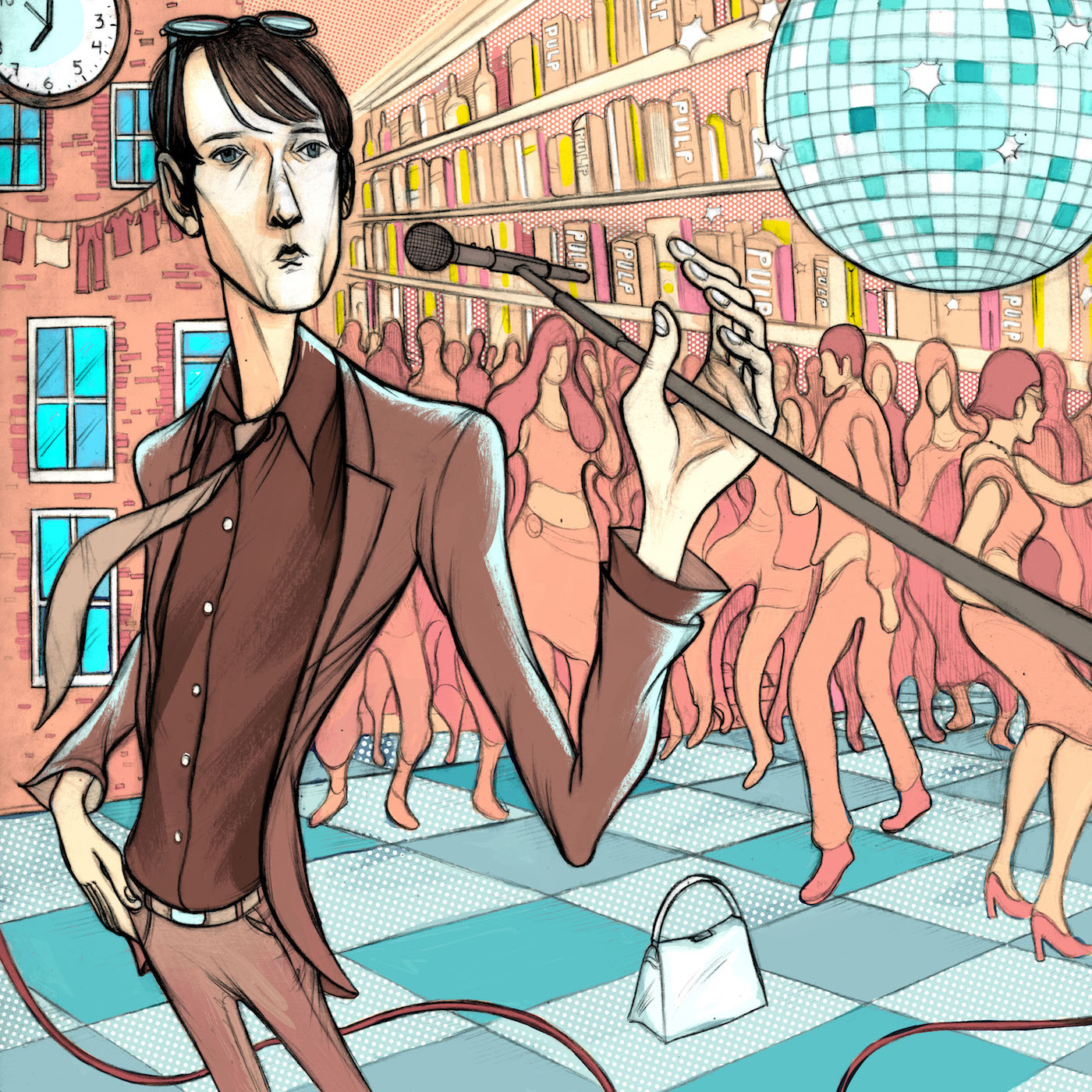
The beauty of Common People is in how the whimsy of the opening of the song – catchy keyboards, a sing-along chorus, and anecdotal lyrics about a chance encounter with a girl at college – suddenly transforms into a tongue-lashing against the upper classes, and their frequent glamorization of working-class life in nineties’ Britain. Wealthy students would live in relative squalor in a rite of passage of sorts, but as Cocker points out in the song, they’d never truly know what it was like to live like the other half because with one phone call to their parents they’d be whisked back to a life of luxury. In the final verse of the song, Cocker lays out the fundamental difference between those struggling to make ends meet, and those playing at it:
You will never understand
How it feels to live your life
With no meaning or control
And with nowhere left to go
You are amazed that they exist
And they burn so bright, whilst you can only wonder why.
The dichotomy at the heart of Common People – a chorus purpose-built to be sung along by groups of people of all upbringings belying a message of division based on social status – is a perfect encapsulation of why Different Class works so well.
Many of the songs are similarly structured, with the unassuming jaunt of their melodies housing deft observations on everyday life in Britain. Disco 2000, which – whether by coincidence or design – bears an uncanny resemblance to the Laura Branigan hit Gloria, is a thoughtful commentary on growing older and pining after a lost love of years previous, the nostalgic effect of which has only been magnified by the fact that the hypothetical future meet-up proposed by the narrator at the turn of the millennium would have occurred seventeen years ago.
Sorted For E’s & Wizz delves into the rave culture of the nineties, and how the friendships one forms in a field in Hampshire while under the influence of illicit substances fade into the ether when the morning comes and the drugs wear off. Something Changed details how the seemingly inconsequential choices people make in their daily lives can, butterfly effect style, lead to immensely important, life-changing moments, while Live Bed Show describes the stagnation of a relationship years down the line through the lens of a once frequently creaking bed:
It didn’t get much rest at first
The headboard banging in the night
The neighbours didn’t dare complain
Oh, everything was going right
Now, there’s no need to complain
‘Cause it never makes a sound.
Anyone who remembers being picked on for being a little different in their youth will likely find a kindred spirit in Mis-Shapes, which touches on similar themes to those explored in Common People from the perspective of the smarter outsiders who might find themselves targeted for abuse by the more stereotypical, loutish members of the working class collective:
We’d like to go to town but we can’t risk it
‘Cause they just want to keep us out
You could end up with a smack in the mouth
Just for standing out, now, really
Jarvis Cocker’s lyrics are a highlight of Different Class, with his wry observations drifting between tragic and amusing in a manner, not unlike Morrissey in his Smiths days, with a similar appeal to those in society that feel left behind by the system or their peers.
While most of the album seems designed to be relatable, I Spy is a cutting revenge fantasy that stands as the darkest moment on Different Class, and one that would presumably serve as the blueprint for much of Pulp’s cantankerous follow-up album, This Is Hardcore. Taking the class war to a frightening extreme, I Spy sees Cocker as a working-class vigilante, sleeping with the wife of an affluent contemporary to exact his revenge for perceived crimes. ‘It may look to the untrained eye/I’m sitting on my arse all day/I’m biding time until I take you all on,’ he spits, before launching into a spiteful tirade at the climax of the song:
You see, you should take me seriously
Very seriously indeed
Cause I’ve been sleeping with your wife for the past sixteen weeks
Smoking your cigarettes
Drinking your brandy
Messing up the bed that you chose together
And in all that time I just wanted you to come home unexpectedly one afternoon
And catch us at it in the front room
Twenty-two years later, Different Class serves as a fitting time capsule, a window peering into mid-nineties Britain and the cultural divide that split the country, but avoids feeling quaint or out of touch as we once again find ourselves torn between two political extremes. 2017 and 1995 are remarkably similar in that regard. A small message in the booklet that comes with the CD version of Different Class sums up Pulp’s mission statement neatly in a few sentences. It reads: ‘Please understand. We don’t want no trouble. We just want the right to be different. That’s all.’ It’s impressive and troubling in equal measure, then, that this is a mantra that still seems relevant and necessary today.
Unlikely prognostications aside, though, Pulp’s Different Class is just a damn good record, that still holds up today because Jarvis Cocker’s lyrical witticisms complement the ear-worm melodies of the songs with clockwork precision. In an age in which anyone with a Spotify account and a mobile phone is the curator of their own listening experience, crafting playlists that whittle down an artist’s discography into just the most enjoyable tracks at a moment’s notice, Different Class is an all killer, no filler album that delivers from start to finish, and requires no such truncation. Oasis and Blur might have been stealing all of the headlines in 1995, but Different Class stands as the defining album of that era.
Contributors

There’s a good chance that while you’re reading this, John McCormick is in his pyjamas with a PS4 controller in his hands. He loves music and movies from the ’80s, considers cheese to be the most important major food-group, and has no regrets about the amount of time he’s spent creating playlists on Spotify.

Daniel Teran is a professional illustrator with extensive experience working with Character Design, Vector Illustration, Drawings (traditional and digital), Editorial Illustration, Commercial Illustration, etc.
-
Thought
Elvis does yoga
December 25, 2017
-
Guest Album Review – “Sound & Color” by Alabama Shakes
This guest review was originally part of a music blog project I created called Under The Deer. Since that site won’t be around forever, I’m archiving these wonderful reviews and their accompanying illustrations here. Writer and illustrator listed at end of the review.
After finding surprise success with their first album, Alabama Shakes released their second studio album, 2015’s Sound & Color, to rave reviews. Front-woman Brittany Howard and the band departed from the blues-soul sound of Boys & Girls to explore a deeper more mysterious sound. Barry Nicholson of NME describes the difference in the album’s writing, saying, “their debut was cast in sepia hues and down-home earthiness, its follow-up is a more kaleidoscopic affair.”
The tracks on Boys & Girls are laden with hearty, soulful influences like Otis Redding. After expressing that they don’t want to “carry the torch” of soul-rock, the band’s sophomore album sheds the essence of the “retro-soul” style to explore a synthy, mystical story. The vibe of the album is reminiscent of the stories told by famed dreamers like Bowie and Zeppelin.
The opening title track sets the tone for the rest of the album. It is an introduction to the new sound and invites the listener to engage by showcasing dreamy xylophone melodies and a softer, wandering performance from Howard. When the listener hears the synthy strings added by Bon Iver’s Rob Moose, they begin to understand the sound they expect from the band is just a little different now.
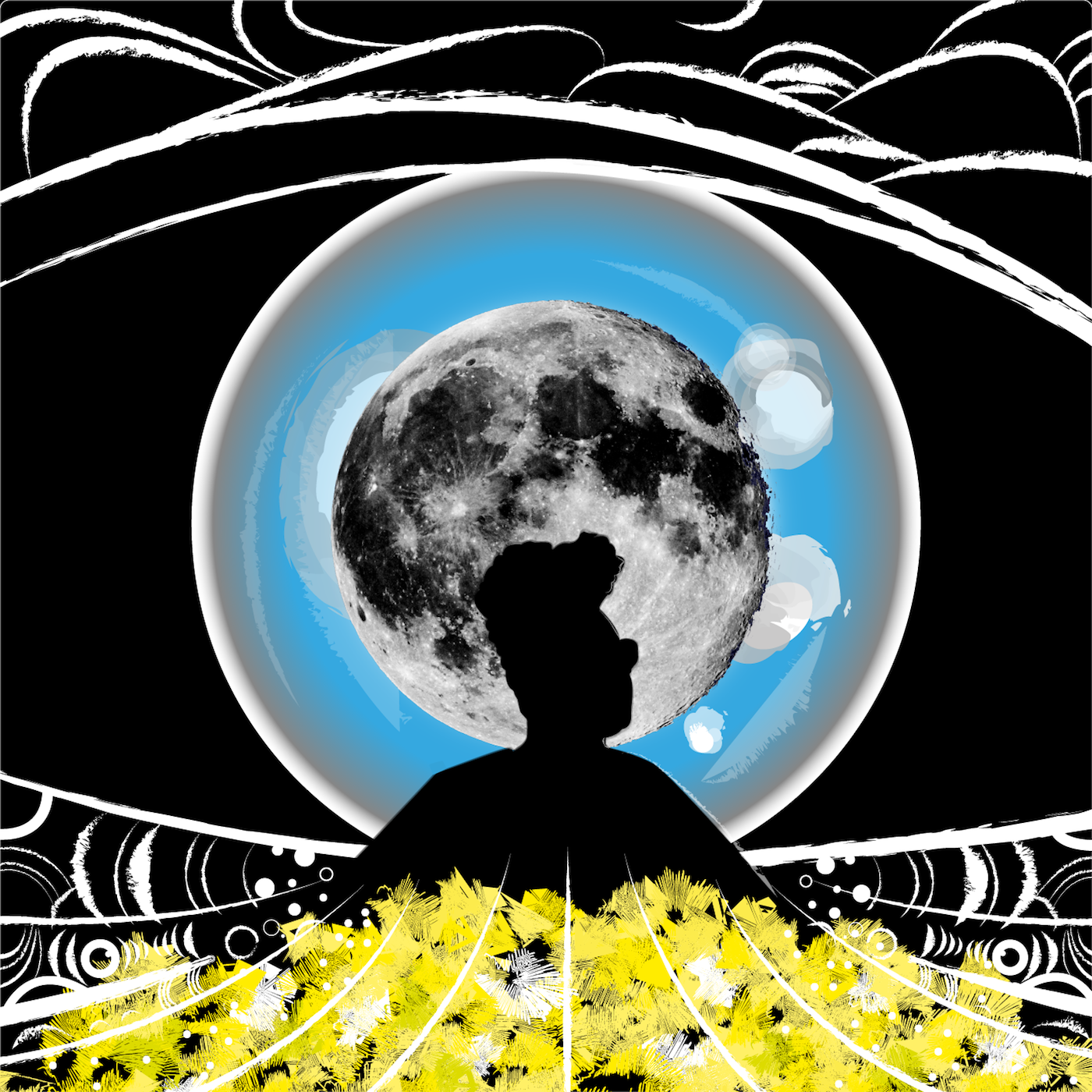
Shoegaze — a reference to a punk rock movement that became popular in the 1980’s — is a masterful track. Fans named the movement’s performers “shoegazers” because of their detached state of performance at shows. This style features heavy feedback, use of effect pedals, and muffled vocals that blend into an overall sound.
Howard’s vocals are more exploratory on this album. She is less forceful and instead offers a subtle build up in each song. After singing in church as a child, Howard has no problem being the singular source of power in a performance. On Sound and Color, she masterfully layers and mixes her voice to match the aura of each song. She still uses her larger than life personality to add depth and interest though. The song Gimme All Your Love is a true showcase of the band’s integration. Howard’s voice yields to trudging a bass solo that leads to a climax that steals the show.
Even though the band is exploring new territory, guitarist Heath Fogg’s style still provides fans with the old-school sound we fell in love with on the first album. His funk grounds the experimental sound and blends beautifully with the organs, strings, synths. The songs on this album take their time to tell their story– and are unapologetic about it.
By taking influence from new places, exploring their sound, and working together, Alabama Shakes created one of the most avant-garde albums of 2015. Rolling Stone notes that “As they grow toward a greatness that does away with others’ assumptions, these proud freaks stay grounded”.
The band invites us as fans to join their journey by remaining humble.
Contributors

Sarah Fletcher was born and raised in Pittsburgh, Pennsylvania. As a legal professional during the day, she feeds her creativity by immersing herself in music at night. She enjoys being a part of the local music scene and checking out as many gigs as she can.

Gabriel Janeiro Grokes is an illustrator, graphic designer, layout editor, guitarist, composer, writer and astrologer. He is an enthusiast of the arts, diversity and the universe.
-
Bookmark
The “Nathan for You” Finale, My New Favorite Love Story
Perhaps “Nathan for You” is ultimately about our unfettered capacity for credulity—not just the suspension of disbelief but the acceptance of the preposterous. Photograph Courtesy Comedy Central Yet often the pretender begins to love truly after all, and oftenbecomes what he has feigned to be.…
December 24, 2017
-
Thought
🤦🏻♂️
Due to a printing error, a few squares in our #GlobeCrossword puzzle are white instead of black. The squares in question are near 156 Across, 245 Down and 355 Across
— The Globe and Mail (@globeandmail) December 24, 2017
December 23, 2017
-
Thought
Ten years in, nobody has come up with a use for blockchain
https://hackernoon.com/ten-years-in-nobody-has-come-up-with-a-use-case-for-blockchain-ee98c180100
-
Review
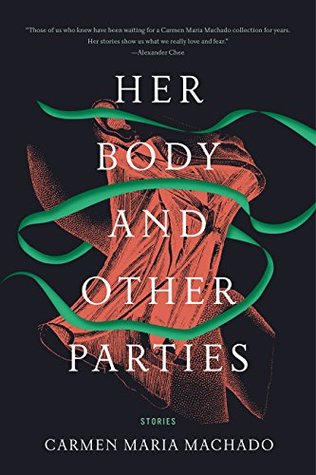
December 22, 2017
-
Guest Album Review – “Heaven Upside Down” by Marilyn Manson
This guest review was originally part of a music blog project I created called Under The Deer. Since that site won’t be around forever, I’m archiving these wonderful reviews and their accompanying illustrations here. Writer and illustrator listed at end of the review.
Continuing to be considered dangerous in this contemporary, shockproof world is not an easy task. It was not only the unrestrained sonic rush and vulgar aesthetics of Marilyn Manson’s Antichrist Superstar and Mechanical Animals that generated such cataclysmic fame for their creator but also people’s natural openness to shock. Nearly two decades later it’s safe to admit that Manson’s shock value has deteriorated. The true shock lies in the realization that it’s so hard to shock people these days.
So, what’s left for an almost 50-year-old shock-rocker to present to the world on his tenth album, now that his first and foremost weapon has become harmless in the modern world? Well, the answer to that quickly became apparent when I heard him screeching the hooligan chorus of We Know Where You Fucking Live and it spread a naughty smile all over my speakers; He is back, and he remains a threat to all of us. It became even more so with the following track SAY10 when I heard the chorus “You say “God” and I say “Say 10″” – man, I fell in love with that pun right away.
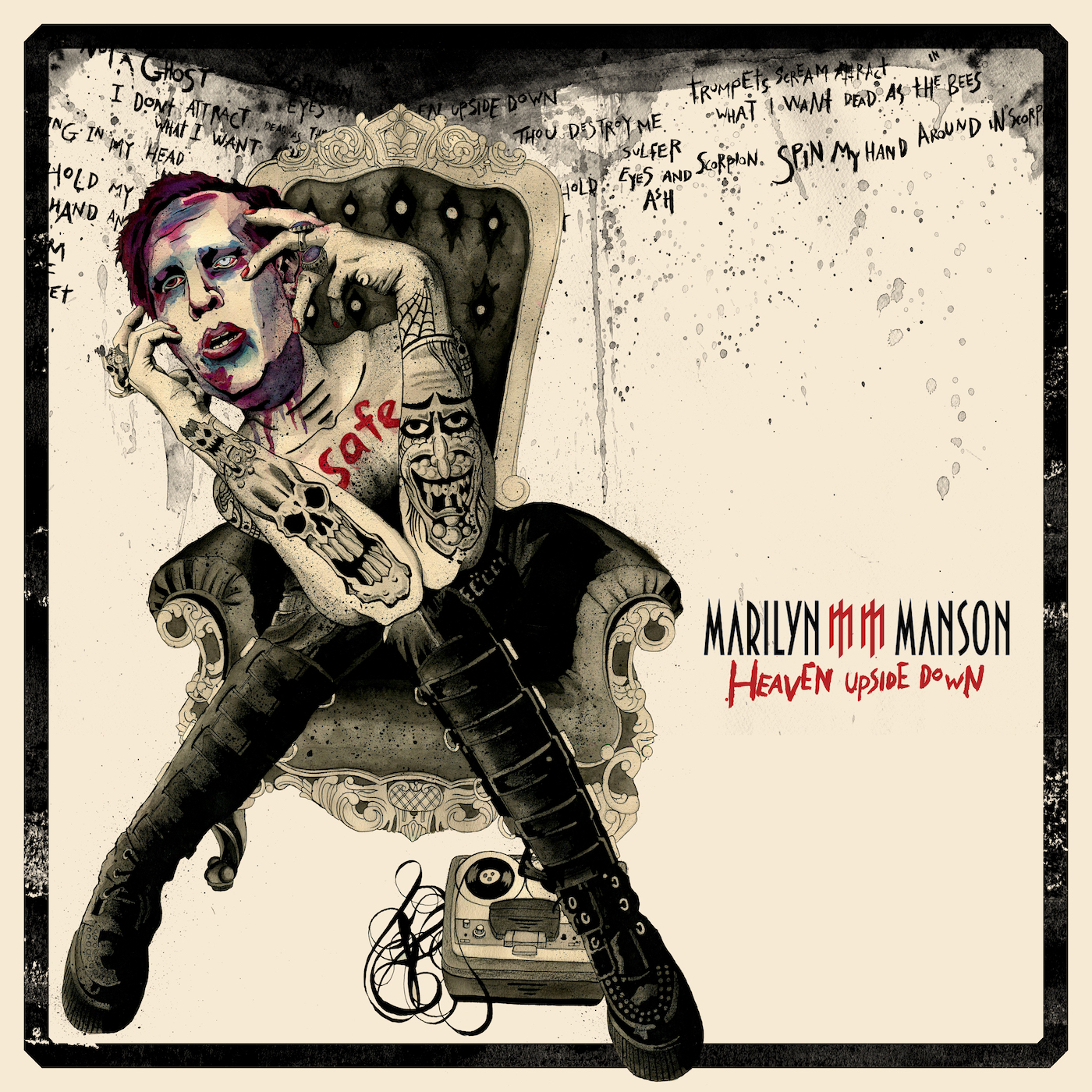
These two tracks were the ones that immediately caught my attention on the album, and while their industrial rock grind is quite indicative of the album’s sonic direction, there is more to it. The post-punk cloak of the 8-minute long Saturnalia has raised a debate among fans as to whether this sound would be a suitable direction for Manson’s future releases.
My personal favorite off the album – Blood Honey – repeats the phrase ”upside down, upside down” more times than the album’s namesake track that follows. As an old fan, I can picture Manson smiling during the mixing of the album, imagining fans looking at their phone screens or the record’s tracklist to make sure that they’re listening to the right track.
All lyrics are written by Marilyn Manson as has always been the case, while all music is composed by Tyler Bates. The album’s overall sound can be described as heavy industrial metal and, while the absence of John 5 and Twiggy Ramirez from the composition credits might fuel the old fans with a hint of negative predisposal, the album solidifies Manson’s comeback – initiated by 2015’s The Pale Emperor – after a decade of distinct artistic decline. It’s the heaviest version of the vocalist that we’ve heard for a long time.
Heaven Upside Down is pure, untamed Marilyn Manson ladies and gentlemen; the very same person who was once considered a lyrical and visual punch against all social conformity today seems like a man with a fork in a world of soup. No obvious Trump remarks; no easy commentary on minority oppression. No safe annotations on feminism. The issues of today’s western civilization are trending all over the Internet, causing massive comment wars. This, of course, would have been an obvious pick for the lyrical frame for an album that is seemingly an attempt to bring Manson’s brand back into the mainstream world. Nevertheless, Marilyn Manson won’t go down that convenient road: instead, he chooses to whistle that same old religion-attacking, drug-advocating, goth-sexy song of his.
One could claim that he plays safe, chewing over his familiar themes. I say that he dares to be culturally irrelevant, going through the ordeal of artistically resurrecting himself without any deliberated, pretentious tricks.
Danger and shock were the foundation of Marilyn Manson’s cultural impact back in the 90’s. There is no more space for shock and danger in music, but there is plenty of space for this middle-aged man’s angry new album on my record player.
Contributors

Nektarios Oikonomakis is a freelance music marketer / VA. He has worked as a radio host and a music journalist. He lives in the place where democracy was born, Athens, Greece.

Daniel Greenhalgh is an Irish illustrator/designer currently living and working in Bucharest. His illustration style is heavily influenced by German expressionist film, especially Wiene’s Dr. Caligari, but also modern expressionistic directors like Leos Carax (the atmospheric shadow play of ‘Boy meets Girl’) and David Lynch (the absurd characters that somehow appear natural within the world he has created). The use of traditional mediums such as ink and watercolor gives both his illustration and typographic work a sense of texture, and quite often a grunginess.
-
Thought
Live video feed from Coinbase HQ: pic.twitter.com/80wYv6K7bd
-
Thought
OK Cupid expects users to use their real names? They imply usernames are a way of showing your creativity rather than offering valuable pseudonymity.
I kind of think they missed the boat on this one.
https://theblog.okcupid.com/an-open-letter-on-why-were-removing-usernames-addressed-to-the-worst-ones-we-ve-ever-seen-dd017c75d49a
December 21, 2017
-
Photo
It’s the sting of snowflakes that makes the place feel so festive.

-
Thought
Netflix’ “Manhunt: Unabomber” series is surprisingly sympathetic to Ted Kaczynski’s cause.
December 20, 2017
-
Guest Album Review – “Ys” by Joanna Newsom
This guest review was originally part of a music blog project I created called Under The Deer. Since that site won’t be around forever, I’m archiving these wonderful reviews and their accompanying illustrations here. Writer and illustrator listed at end of the review.
When it comes to music, it seems that everyone’s a critic, even with near-perfect albums like Joanna Newsom’s 2006 Ys (pronounced eees or yeeesh). This 5-track, exquisitely crafted work by the singer-songwriter-harpist not only holds its own as an outstanding example of her artistic fortitude; the addition of a full-piece orchestra (arranged by Van Dyke Parks) creates the kind of aural opulence rarely achieved in any musical context, let alone via a squeaky-voiced, 20-something folk harpist.
While for the most part, the album was highly acclaimed, people have accused the album – and by extension, Newsom – of being self-indulgent, which begs the question: What creative masterpiece isn’t a little self-indulgent? If creativity stems from deep reflection, imaginative courage, and, yes, probably some emotional neuroses, it must, by definition, be self-indulgent.
But what makes a great piece of art is its ability to reach the audience. And while this album may, at first, seem a little bit “out there” (at least lyrically), one only has to listen for a moment to understand its depth. It is rife with purpose, both thematically and in the way it shows Newsom’s mastery as a poet and musician.
Ys transports us to other lands–the sky, the sea, the forest–then it sweeps us back home again, a thematic rhythm echoed through composition: we’re away, and she’s almost lost us (but it’s still fascinating), and suddenly we’re right back with her again.
We’re perplexed…we get it.
We’re adrift…we’re grounded.
We’re dreaming…we’re awake.
And so go the undulations of time, love, loss.
Ys is an otherworldly album, lyrically, structurally and aurally. It is at once not of this earth and incredibly relatable. Her inner journey is strange, each verse turning a new corner with unusual imagery. It’s an open invite.
Newsom is not trying to be “abstract;” she just wants us to listen.
Each song pulls us along through intricate adventures accentuated by deliberate pacing and cadence. Orchestral breaks allow us to rest and then listen more closely to lyrics, with one of the first notable gaps highlighted by a pared-down tempo in Emily:
You came and lay a cold compress upon the mess I’m in
Threw the window wide and cried, “Amen! Amen! Amen!”
The whole world stopped to hear you hollering
You looked down and saw now what was happening.
The lines are fading in my kingdom
(Though I have never known the way to border them in).
Here we again are brought from some wild outdoor spectacle and into a scene so simple it’s almost pastoral: she’s in a room, sick in bed, her sister at her side. It’s a vulnerable moment that reminds us that she is not an ethereal, otherworldly being: she is mortal. She’s just like us.
And she wants us to know her.
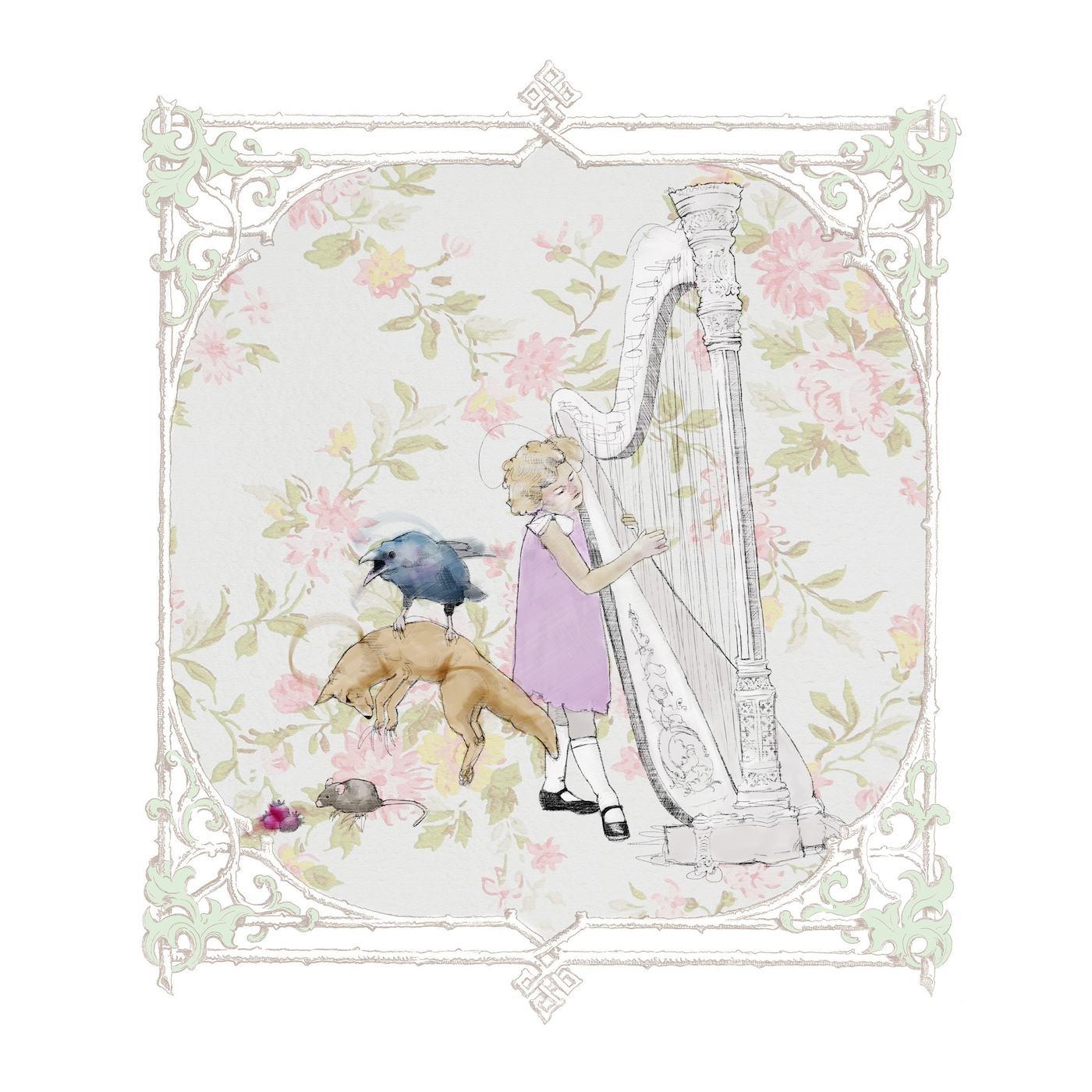
The album continues to wax and wane through crescendos (and diminuendos), always moving, often dramatic. Every verse turns a corner into a new scene, and this happens so frequently that it’s hard to keep up, but not in a bad way. Ys is a cozy blanket, a bizarre adventure, a wise tale, an intricate dance.
Some critics balk at her voice, and it’s true that it’s not easy at first. But it’s so unabashedly raw that we must take it as is. As something both childlike and urgent, it’s integral to her tapestry. And we have to remember that she is, after all, a harpist and storyteller who is using her voice as an instrument. It’s a good reminder of how important it is to listen to the heart behind the voice.
Sawdust and Diamonds is equally as entrancing as the rest of the album, but without orchestral backing, it’s fine proof of how well she can hold her own, of that unearthly space she occupies as both artist and human. It’s the kind of thing that makes us believe in the muse, wondering at every turn, “where the hell does she come up with this?” and keeping us fascinated as we join her in that other place and time.
Her ability to lead us through shifting landscapes with such ease is clear once we get to Sawdust, where she is a lost mariner where the bell, “tolls for thee,” on her way back to shore. She returns from the shifty, uncertain time and back to her love, despite their relationship being as fleeting as “a sandcastle that the gibbering wave takes.”
A particular image stands out towards the end of the song, as something that seems so much like her: a doe-eyed, delicate creature born with innate wisdom. This creature is tenacious, awake, yet somehow unable to escape the burden of love that defines us as humans.
I wasn’t born of a whistle or milked from a thistle at twilight
No I was all horns and thorns sprung out fully formed, knock-kneed and upright.
So: enough of this terror, we deserve to know light
And grow evermore lighter and lighter
You would have seen me through
But I could not undo that desire
The fourth song, the 16-minute Only Skin, carries us through spectacular orchestral arrangements which illustrate sharp emotional landscapes. As with her other songs, each verse is more resplendent than the last. The delicate integration of poetic structure, vocal cadence, tempo changes and signature shifts work with the music to fly us from ocean to cabin to prairie. We are next to our lover, then distant; yearning, then content; alone, then connected.
Press on me,
we are restless things.
Webs of seaweed are swaddling.
And you call upon the dusk of the
musk of a squid:
shot full of ink, until you sink into your crib.
Rowing along, among the reeds, among the rushes,
I heard your song, before my heart had time to hush it!
Smell of a stone fruit being cut and being opened.
Smell of a low and of a lazy cinder smoking
And when the fire moves away,
fire moves away, son.
Why would you say
I was the last one?
This is not just any old album: it’s a story, a painting, a world unto its own. It’s a richly bittersweet testament to the temporary nature of all that is life, and thank goodness we have the pleasure of experiencing Ys again and again. In its warmth and complexity, Ys reveals more each time we give it a listen, perhaps akin to the kind of relationship most could only dream of.
Contributors

Renée Picard is a freelance writer-editor who leads life with a soft-but-fierce heart.
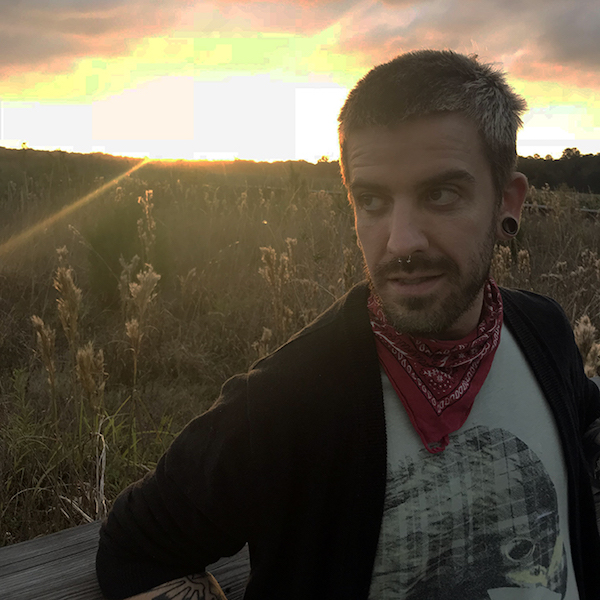
Jonathan M James In a single brushstroke Jonathan blends the familiar and the grotesque to create an abstraction that defines the complexity of the human experience; often resulting in an isolated element that exists in a single moment.
-
Thought
The desiccated corpse of rock ’n’ roll has nearly been picked to the bones.
Remember, “Rock ’n’ Roll will never die” was a cautionary warning, not a triumphal shout.
-
Thought
Find a niche, then work your niche. pic.twitter.com/QJeZbwQivn
-
Bookmark
William Gibson interviewed: Archangel, the Jackpot, and the instantly commodifiable dreamtime of industrial societies
William Gibson’s 2014 novel The Peripheral was the first futuristic book he published in the 21st century, and it showed us a distant future in which some event, "The Jackpot," had killed nearly everyone on Earth, leaving behind a class of ruthless oligarchs and their bootlickers; in the 2018…
December 19, 2017
-
Thought
Laurie Anderson (70) is aging really well. pic.twitter.com/uWtClzHhpH
-
Review
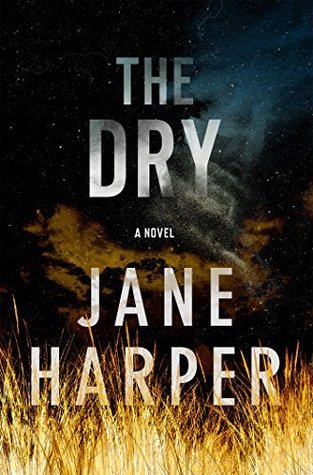
December 18, 2017
-
Guest Album Review – “Darkness on the Edge of Town” by Bruce Springsteen
This guest review was originally part of a music blog project I created called Under The Deer. Since that site won’t be around forever, I’m archiving these wonderful reviews and their accompanying illustrations here. Writer and illustrator listed at end of the review.
The first time I remember hearing Darkness on the Edge of Town, was on a September Friday in Frank Vultaggio’s Audi on the way to a college football game in Philadelphia in 1978.
Surely, I’d heard it before then. The album was released in June of that year.
But it’s the memory of that night that endures. The jugs of beer on the floor in the back of the car. The scream-along to the chorus of Badlands, the album’s opening salvo, followed by the unyielding guitar and dark narrative of Adam Raised a Cain and on through the rest of the cassette and two of our college-days anthems, Prove It All Night and The Promised Land.
Later that night, we watched Springsteen protégés Southside Johnny and the Asbury Jukes perform a post-game concert in the end zone before the hour-drive back with Darkness as the brooding midnight soundtrack.
It would be dishonest to say the album became my favorite that night. It took years before I came to appreciate it as the greatest of the great Springsteen records.
I had to live with those stories, and their characters and their unflinching look at everyday life, something no rock record had asked me to do. I had to sing along to those classics at one Springsteen show after another. The songs at the heart of the album — Badlands, Prove It All Night, The Promised Land and Darkness on the Edge of Town — have been concert staples for nearly 40 years for a good reason.
Like the best art, what the songs on Darkness mean to me has changed over time.
The album I first heard in 1978 evokes different emotions now than it did then or in 1997 when my children were born, or 2003 during The Rising Tour, or 2016 during The River Tour. It got me through breakups and celebrations, pain and joy, and more long road trips than I can remember.
A song like The Promised Land offered an unbroken horizon of possibilities hearing it in 1978. By the Rising Tour in 2003, it was a balm, the possibility of redemption. Now, it’s a reminder to still believe, to still explore, and to be present for the ride, a celebration of the hope central to life. It’s my favorite song, and it never grows old.
I’ve seen Springsteen more than twenty times. Each show is as rousing, redemptive, reflective, and joyous as the first. And, despite its dark lyrics, The Promised Land is a defiant, fist-pumping anthem at every show, testimony to the brilliance of the writing on Darkness.
There’s a dark cloud rising from the desert floor
I packed my bags and I’m heading straight into the storm
Gonna be a twister to blow everything down
That ain’t got the faith to stand its ground
Blow away the dreams that tear you apart
Blow away the dreams that break your heart
Blow away the lies that leave you nothing but lost and brokenhearted
The dogs on Main Street howl,
’cause they understand,
If I could take one moment into my hands
Mister, I ain’t a boy, no, I’m a man,
And I believe in a promised land
I believe in a promised land…
Throughout Darkness, Springsteen pits the hard reality of the working life (listen to Factory) and the bitter setbacks of his weathered characters, against the thin line of hope and possibility that sends them trudging into each new day.
“You spend your life waiting for a moment that just don’t come,” Springsteen sings on Badlands, the charging opener. But at the end, he’s still finding hope. “I believe in the love that you gave me,” he says. “I believe in the hope that can save me. I believe in the faith and I pray that someday it may raise me about these badlands.”
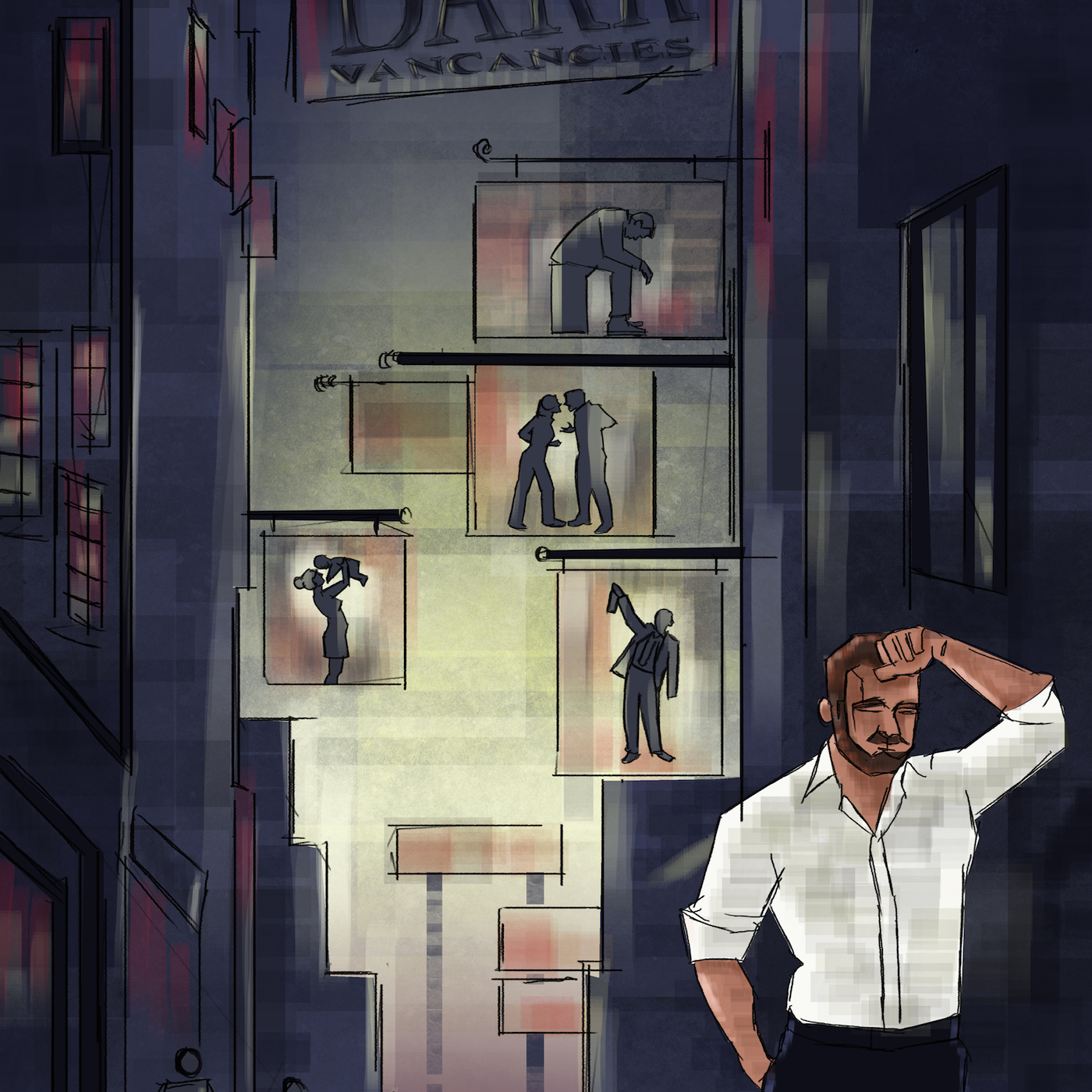
Listen to the lonesome moan at the beginning of Something in the Night for a narrator who finds the things he loved crushed and dying in the street, but continues chasing something in the night.
Sit alone and ponder the lyrics of the daring ballad, Racing in the Street:
Some guys they just give up living
And start dying little by little, piece by piece
Some guys come home from work and wash up
And go racin’ in the street.
On many of the album’s songs, the darkness grudgingly surrenders to the innocent belief there is something better within reach, whether it’s the promised land, whatever that may be, the escape of racin’ in the street, or the resolve to prove it all night. Throughout, the music and the lyrics are stripped down, serving the stories. Gone is the Wall of Sound from Born to Run, his breakthrough. Gone are the broad sketches of his early albums; for these songs, Springsteen zooms in on the characters. Their stories are as carefully sequenced as loosely-connected chapters or a novel, exploring work, love, family and our darkest fears and deepest hopes. Springsteen knows the journey isn’t linear or logical. Merely surviving can be a burden. But to survive is to have hope.
Springsteen was 27 and in the midst of a writing frenzy when he made Darkness. More than 40 songs were recorded during the sessions for the album, including Because the Night, which became a hit for Patti Smith, and Fire, a hit for The Pointer Sisters. He consciously left those off the record so they would not overshadow what he was trying to do. “I began to listen seriously to country music around this time,” Springsteen wrote in an essay two decades after the album’s release. “I discovered Hank Williams. I liked the fact that country dealt with adult topics, and I wanted to write songs that would resonate down the road.”
He’d long been into film noir and that became an even greater influence with films like John Ford’s “The Grapes of Wrath.” The album was written and recorded during the punk frenzy and those influences found their way into the songs. He culled the songs to the toughest, songs he says still form the philosophical core of what he and the band do today.
“Darkness on the Edge of Town,” he wrote, “dealt with the idea that the setting for personal transformation is often found at the end of your rope.”
On most of the ten songs, the characters are unnamed. They’re everyman and everywoman, you and me, our neighbors and friends. So we frame the meaning of those songs with our particular windows on the world, taking from them what we need.
In the end, Darkness is the rare album that examines what it’s like to be an adult who manages to move forward haunted by the ghosts of their regrets.
“Most of my songs are emotionally autobiographical,” Springsteen says. “You’ve got to pull up the things that mean something to you for them to mean anything to your audience. That’s how they know you’re not kidding.”
Looking back in 2010, Springsteen wrote to fans that he hoped he’d “written something that would continue to fill me with purpose and meaning in the years to come, that would continue to mean something to me and to you.”
For me, at least, he’s fulfilled that considerable ambition, creating a layered album that endures day after day, year after year.
Contributors

Jim Morrison has flown barrel rolls with the Navy’s Blue Angels (he didn’t barf), climbed and slept overnight in a 243-foot-tall redwood (he didn’t fall), and gone one-on-one with Muhammad Ali (he didn’t flinch). His stories have appeared in Smithsonian, The New York Times, The Wall Street Journal, and dozens of others.

Rebecca Arnold aka Bex is a Mama Bear, freelance story artist and illustrator, and Universe enthusiast.
-
Thought
This week’s Stupid Monkey Brain newsletter includes:
🍌Are You a Jerk?
🍌A Life Without Mental Images
🍌Shaka, When the Walls Fell
🍌How to Be Alone
🍌Duck Sex
🍌The Joys and Sorrows of Watching My Own Birth
and loads more!
http://www.stupidmonkeybrain.com/issues/stupid-monkey-brain-issue-9-87124
pic.twitter.com/OjjqUtImSa
December 17, 2017
-
Thought
Jeeezus
— Peanuts On This Day (@Peanuts50YrsAgo) December 17, 2017
December 15, 2017
-
Guest Album Review – “Soft Sounds From Another Planet” by Japanese Breakfast
This guest review was originally part of a music blog project I created called Under The Deer. Since that site won’t be around forever, I’m archiving these wonderful reviews and their accompanying illustrations here. Writer and illustrator listed at end of the review.
With her second album Soft Sounds from Another Planet, Michelle Zauner, better known as Japanese Breakfast, re-emerged with a uniquely experimental pop record, summoning influence from a hurricane of loss, grief, changes in location, failed relationships, raw and playful sexuality, and the opportunity to tour with recently reunited shoegaze legends Slowdive.
Originally from Oregon, she moved to Philadelphia, where she quickly established popularity fronting the band Little Big League. After releasing two albums, she called it quits to return home, where her mother had died of cancer. Her debut studio album, Psychopomp, came soon after, marking both her return to music and Philadelphia’s flourishing music scene. As a New Yorker, I remember first hearing her album and enjoying it solely as a cute, lo-fi, pop album. However, the hilarious lyrics, the undiluted sexuality, the childlike playfulness, and a sort of underlying melancholy permeating the album, inspired further listening.
The songs Heaven and Everybody Wants to Love You could be heard hummed by a passing stranger in the middle of the night in Bushwick. I saw her three times in New York City, the last time being at a tiny venue called Baby’s All Right, which sold out quickly. The crowd knew every word, sang, danced, moshed, and reveled in the glory of a much-anticipated show by an artist effortlessly capturing universal yet deeply personal feelings in an irresistible way.
I saw her again at the Music Hall of Williamsburg a year later, shortly following the release of Soft Sounds from Another Planet. The woman I saw perform on that stage had become a grown woman, accomplishing more than most musicians hope for in their entire lifetimes, despite the tragedy of the loss of her mother. It was a far more somber, meaningful, and ultimately more fulfilling experience than previous times I’d seen her. Although a few tracks from Psychopomp brought back memories of a time a one year earlier when NYC was practically her second home, and the carefree vibe or her shows could be felt, it was clear that her new material was not meant to fit within that post-punk revival, poppy indie rocker scene.
Although Michelle Zauner had contemplated quitting music entirely after Psychopomp, the surprising reception of that album eventually landed her a spot supporting the newly reunited Slowdive on tour, a spot most musicians would kill for. Although their influence on Softer Sounds from Another Planet is undeniable, this is still Zauner’s record.
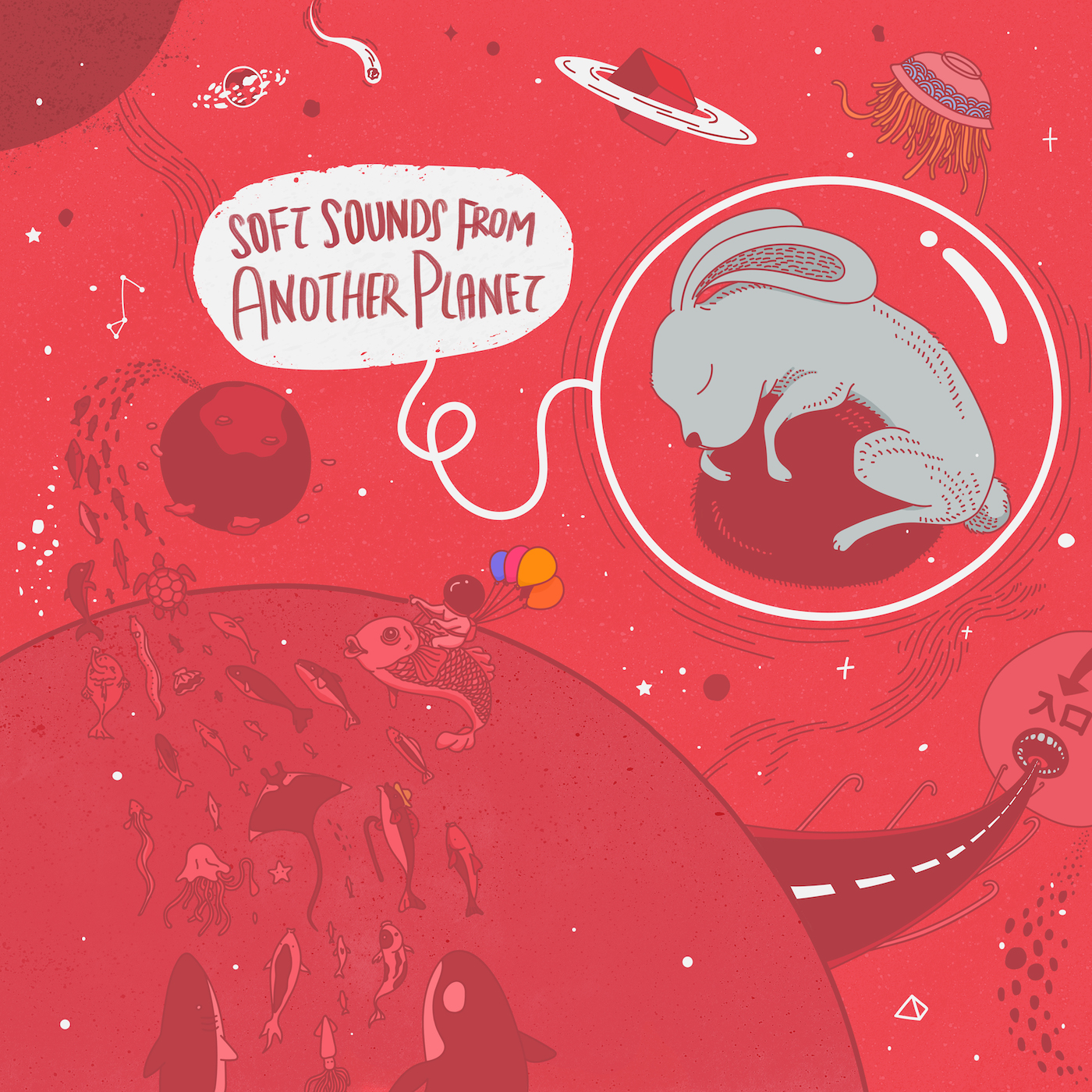
With this album, comes a polished, beautifully produced, experimental pop record, which sounds as if it was recorded in space, complete with shooting stars flying by, planets and galaxies groaning from far distances, stars dying and being reborn, and mysteriously strange sounds emanating from menacing black stars. In other words, meticulously crafted pop music, featuring dreamy synths, emotionally satisfying vocals in the forefront, skilled rhythmic drumming driving everything forward, and criminally underrated bass lines tying everything together into near sonic perfection.
Despite the otherworldly sounds, the focus remains on Zauner’s experiences here on Earth, for example, a relationship where her efforts to please her partner go unreciprocated. On the track Boyish, the lyrics “I can’t get you off my mind, I can’t get you off in general” are a perfect example of the sad yet clever wordplay Zauner is best at. Musically, the song ends with a solo that mirrors the sentiment of the song exactly. The following track, 12 Steps, comes closer to her previous album, building up quickly and hitting the listener with a surprisingly old-school sharpness in her guitar tone as she sings “tell me I can’t blame you, we let love run its course and it’s a little bit lonelier, I don’t blame you, we let love run its course and it’s a little bit hard…”
The first track, Diving Woman, will come as a bit of a shock to those who have been following her career for a couple of years. While Psychopomp featured playful moments it almost felt like she hadn’t quite yet processed her mother’s death. You can sense in this opening track she’s grown more than most musicians do in a lifetime. The contrast is as startling as the lo-fi grittiness of the first album compared to the polished beauty in Softer Sound’s production. Zauner wants it all, and it’s obvious she’s turned all of her grief and suffering, along with unexpected happiness, into an album that’s sublimely produced. It draws you into her strange world over the journey of twelve songs.
Softer Sounds is an album that, because of its unique circumstances, transcends its scene, one full of artists like Porches, Alvvays, Frankie Cosmos, or fellow Philadelphian Mitski. Although I respect those artists, no album has surprised me by displaying such immense, unprecedented growth as an artist. Think about Grizzly Bear’s Yellow House, the following tour with Radiohead, and then how Veckatimest changed the landscape of the indie world at the time. Unlike Grizzly Bear, I believe instead of changing her current scene, she has created a record different from anything heard before. It’s the perfect time capsule of the later 2010’s on the East Coast, where post-punk and shoegaze’s revival dominate local venues, while at the same time providing a stunning-self portrait of Michelle Zauner’s soul.
Contributors

Alex Khan is originally from Kansas and is now trying to make it as a copywriter, branding consultant, and musician in NYC
.

Choon is a freelance illustrator and Star Wars geek.
